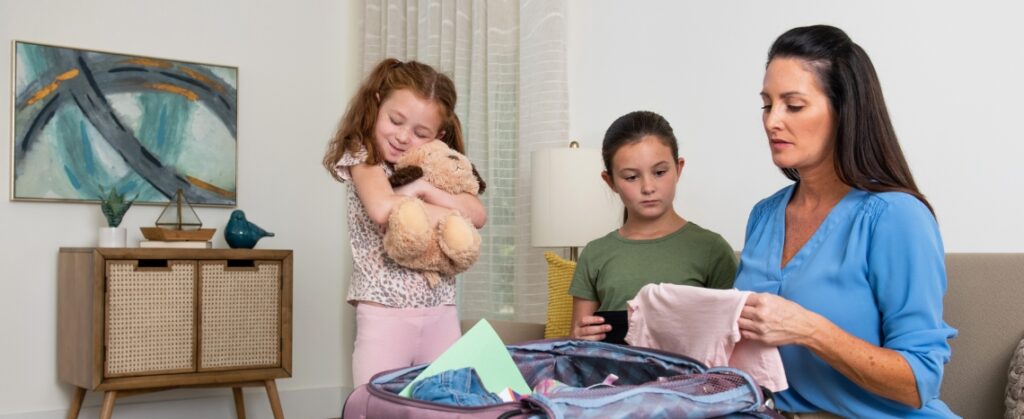- 24-HOUR HOTLINE: (904) 354-3114
- 24-HOUR TEXTLINE: (904) 210-3698
Understanding Domestic Violence
Finding safety from domestic violence can be complicated and dangerous.
One of the first questions people normally ask when they learn someone is in an abusive relationship is
“Why doesn’t the victim just leave?”
This question makes it seem like leaving is easy. In fact, it is complicated and dangerous.
There are many reasons leaving an abusive relationship is not quick or simple to do.

The victim knows how violent the abuser can be. They know how the abuser has threatened to kill the victim or their children. They fear what will happen if they leave, but the abuser finds them.
The abuser will also make the victim afraid to reach out for help:
There are many different tactics an abuser will use against their partner. Many of those abusive actions not only directly harm the victim but affect their ability to leave the relationship.
For example, the abuser may control the family’s money, so the victim doesn’t know how they would be able to pay for housing or food if they leave.
An abuser will do anything they can to keep control of the victim. At times, this could mean making promises to change or even taking action to make it seem like they’re changing, when they’re not.
An abuser may tell the victim that they’ll go to anger management or substance use treatment, but never follow through. An abuser may even agree to go to counseling or a batterer’s intervention program, but not take the program seriously. With these promises, the abuser is not actually committing to change; they’re saying and doing whatever it takes to keep their partner with them.
To be clear, the abuse is a choice the abuser commits.
A victim’s ability to leave, though, may be made more challenging by social and economic factors. If housing is expensive, unemployment is high, grocery and gas costs are rising, etc., then the victim may struggle to see a future where they can stand on their own.
To be clear, the abuse is a choice the abuser commits.
A victim’s ability to leave, though, may be made more challenging by social and economic factors. If housing is expensive, unemployment is high, grocery and gas costs are rising, etc., then the victim may struggle to see a future where they can stand on their own.
They may also be part of a culture that values family privacy or keeping relationships together, no matter what.
An abuser will damage the victim’s friend and family relationships, so the victim may not have anyone they trust to help them leave.
If the victim does have someone that could help them, that person may not be supportive. They may believe what the abuser has said or tell the victim that their partner deserves “another chance.”
The abuser may also tell the victim that organizations like Hubbard House won’t help them. That is not true. Hubbard House supports all victims of domestic violence with life-saving shelter and services.
The victim faces countless challenges when trying to leave an abusive relationship. We shouldn’t ask why a victim stays. We should ask why the abuser chooses abuse. We should ask why the abuser doesn’t stop the violence.
SIGN UP FOR OUR NEWSLETTER
A COPY OF THE OFFICIAL REGISTRATION AND FINANCIAL INFORMATION FOR HUBBARD HOUSE, A FLORIDA-BASED NONPROFIT CORPORATION (REGISTRATION NO. CH 928), MAY BE OBTAINED FROM THE DIVISION OF CONSUMER SERVICES BY CALLING TOLL-FREE 1.800.HELP.FLA (435-7352) WITHIN THE STATE OR VISITING www.800helpfla.com. REGISTRATION DOES NOT IMPLY ENDORSEMENT, APPROVAL, OR RECOMMENDATION BY THE STATE.
Hubbard House, Inc. does not discriminate on the basis of race, color, religion, age, national origin, mental or physical disability/disability status, sex/gender, pregnancy, military status/status as a veteran, genetic information, citizenship, immigration status, marital status, sexual orientation, gender identity, gender expression, limited English proficiency, language spoken, or other legally protected status. Hubbard House, Inc. facilities and venues are accessible, and we will provide accommodations, including foreign language interpreters, American Sign Language interpreters, assistive listening devices, alternative formats of printed materials, and real-time captioning, upon request for persons who are Deaf, hard of hearing, or are living with disabilities, or for persons who are limited English proficient. To ensure that you receive the necessary accommodations, please make your request no later than 7 days prior to the event to accommodations@hubbardhouse.org so that they can be available to you from the start of the event.
A COPY OF THE OFFICIAL REGISTRATION AND FINANCIAL INFORMATION FOR HUBBARD HOUSE, A FLORIDA-BASED NONPROFIT CORPORATION (REGISTRATION NO. CH 928), MAY BE OBTAINED FROM THE DIVISION OF CONSUMER SERVICES BY CALLING TOLL-FREE 1.800.HELP.FLA (435-7352) WITHIN THE STATE OR VISITING www.800helpfla.com. REGISTRATION DOES NOT IMPLY ENDORSEMENT, APPROVAL, OR RECOMMENDATION BY THE STATE.
©2023 Hubbard House is a 501 (c)(3) | Privacy Policy